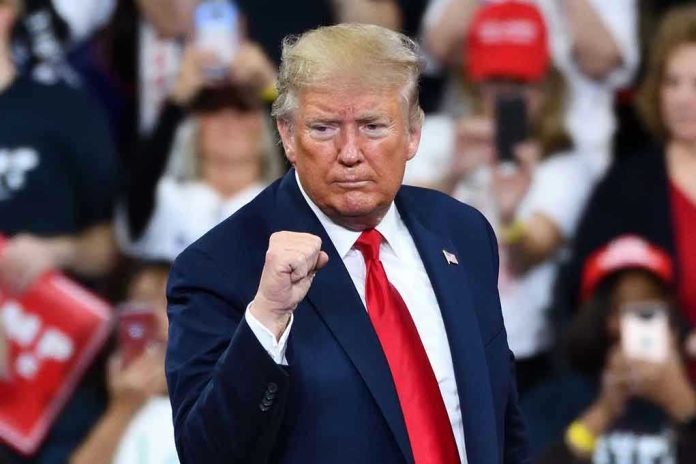
President Trump’s swift revocation of Biden’s competition executive order dismantles Washington’s regulatory grip, signaling a decisive shift away from bureaucratic overreach and towards restoring constitutional limits on federal power.
Story Snapshot
- Trump’s August 2025 executive order repeals Biden’s sweeping competition framework, curbing federal agency authority and ending “whole-of-government” regulatory expansion.
- The move halts ongoing Biden-era enforcement actions, including the FTC’s controversial non-compete ban, and realigns federal priorities toward market-driven policies.
- Deregulation is expected to boost business flexibility, counter regulatory excess, and address conservative concerns over government intrusion into the economy.
- The policy reversal intensifies the national debate over the proper limits of federal power and the defense of free enterprise principles.
Trump’s Order: A Direct Rebuttal to Biden’s Regulatory Agenda
On August 13, 2025, President Donald Trump issued a concise executive order revoking the Biden administration’s 2021 Executive Order 14036, which had empowered federal agencies to aggressively regulate markets from Main Street businesses to Wall Street giants. Unlike Biden’s 14-page directive, Trump’s brief order eliminates the “whole-of-government” approach, restoring a deregulatory framework and immediately halting efforts to expand agency power over the private sector. This action is seen by supporters as a victory for constitutional governance and a rejection of Washington’s regulatory overreach.
Biden’s original order, issued in July 2021, sought to address concerns about market concentration and monopolistic practices by directing agencies such as the Federal Trade Commission (FTC) and Department of Justice to regulate labor, healthcare, technology, and agriculture sectors more aggressively. Under Biden, the FTC moved to propose a near-total ban on non-compete agreements in 2024, triggering intense legal battles and raising alarms among those who viewed these actions as federal overreach threatening employer rights, business flexibility, and even traditional values surrounding private enterprise.
Immediate Regulatory Consequences and the Return to Deregulation
Trump’s order not only dismantled Biden’s regulatory structure but also signaled a rapid reversal of ongoing federal actions. With Andrew N. Ferguson, a Trump appointee, now leading the FTC, legal disputes over the non-compete ban are expected to be dropped or reversed. Business groups have welcomed the order, arguing it will reduce compliance costs, promote economic growth, and restore balance between free enterprise and government oversight. Regulatory agencies are now reviewing other Biden-era rules for potential rollback, further reinforcing the administration’s commitment to limited government and deregulation.
Critics of Biden’s approach had long argued that empowering agencies to dictate market policy stifled job creation, innovation, and economic liberty. The Trump administration has instead prioritized “robust protections of the legitimate business interests of employers,” reflecting a core conservative belief in individual and business autonomy against bureaucratic dictates. This shift is particularly significant for sectors like technology, healthcare, finance, and agriculture, where excessive regulation was seen as a drag on competitiveness and common-sense business practices.
Long-Term Impact: Deepening the Divide Over Federal Power
The revocation order’s short-term effects are clear—immediate suspension of Biden-era enforcement and an end to the FTC’s push for far-reaching labor regulations. In the long term, the policy change is expected to increase the use of non-compete agreements, reduce federal scrutiny of mergers and acquisitions, and potentially encourage industry consolidation. While this may enhance employer flexibility, critics warn of risks to worker mobility and consumer choice. The move has deepened the national debate over the appropriate scope of federal power, with conservatives celebrating the restoration of constitutional limits and critics raising concerns about unchecked corporate influence.
Trump revokes Biden’s swamp-first regulations order https://t.co/Z31d98ODsd
— Washington Examiner (@dcexaminer) August 18, 2025
Expert analysis highlights the broader ideological divide: supporters of Trump’s deregulatory approach emphasize economic freedom, reduced compliance burdens, and a commitment to core American values such as limited government and free enterprise. Opponents, however, caution that deregulation could erode worker protections and consumer safeguards. As regulatory agencies rapidly shift their priorities, businesses and workers face a period of adjustment, with the broader outcome hinging on the continued defense—or expansion—of constitutional principles and market-driven policies.
Sources:
Trump revokes Biden executive order on competition, impacting healthcare markets
Revocation of Executive Order on Competition
Trump’s 2025 Executive Orders Chart









